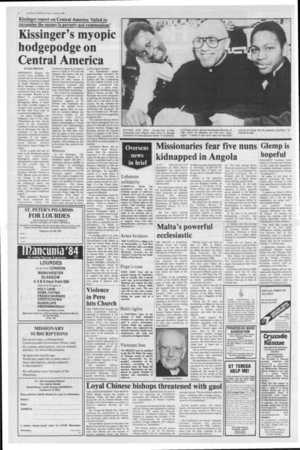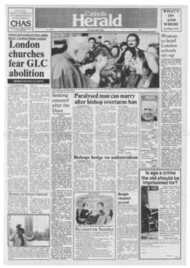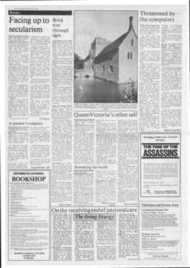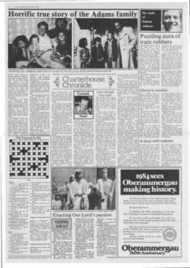Page 2, 27th January 1984
Page 2

Report an error
Noticed an error on this page?If you've noticed an error in this article please click here to report it.
Tags
Share
Related articles
Archbishop Gonzi Of Malta Resigns
Bowen At Gonzi Funeral
Maltese Hopes For Settlement Still High
Malta Story Moves To Rome As Archbishop Takes Case To...
"not Fit T 0 Be Malta's Bishop" Revival Of Old Controversy
Malta's powerful ecclesiastic
THE DEATH of Archbishop Michael Gonzi last Sunday brings to an end one of the longest and most controversial episcopacies of recent years.
If Archbishop Gonzi had died in his seventies rather than his late nineties he would undoubtedly have escaped at least some of the criticism his thought and actions provoked even within the ranks of the Church.
A profile of the archbishop written in the Catholic Herald some 22 years ago called him
"Malta's valiant archbishop" and supported him for putting Mr Dom Mintoff under interdict. (This occurred in April 1961) and issuing a
directive that Catholics who had anything to do with the Labour party newspaper, even reading it, committed mortal sin.
But that was before the Second Vatican Council, when Catholics, even in Britain, were used to stringent papal and episcopal directives, though not to such close interference in state politics. Michael Gonzi was born on May 13, 1885, in Malta's dockland. He was educated at the Malta Seminary, the Royal Malta University, and the Gregorian University in Rome. He was ordained in 1908.
He became Bishop of Gozo in 1924 (four years before the present Archbishop of Malta, Joseph Mercieca, was born) and succeeded to Malta's senior see in 1943. In 1944 Pope Pius XII made him a metropolitan as well as titular archbishop, with jurisdiction over Gozo.
In secular life he was also an achiever. He was a former parliamentarian and founder member of the Malta Labour Party, and a Brigadier in the British Army.
During his 33 years as Archbishop of Malta, he was at loggerheads with Mr Borg Clivier, a former prime minister, and with Mr Dom Mintoff.
He fought against Mr Mintoff's nationalism in spite of Mintoff's popularity with the Maltese. His defence of traditional Church rights and values, often in the most conservative manner, brought him ridicule, not just from Mr Mintoff, but from many other quarters, Mr Ernest Sevin once called him "a bigot and a medieval tyrant".
Yet he will be remembered as the man who built a network of free schools and eradicated much of Malta's illiteracy.
His appointment as a KBE after the war was an unusual honour, and made him the first Catholic bishop to receive a British knighthood. He earned it for keeping up the morale of the Maltese in the face of Hitler's bombers.
blog comments powered by Disqus











